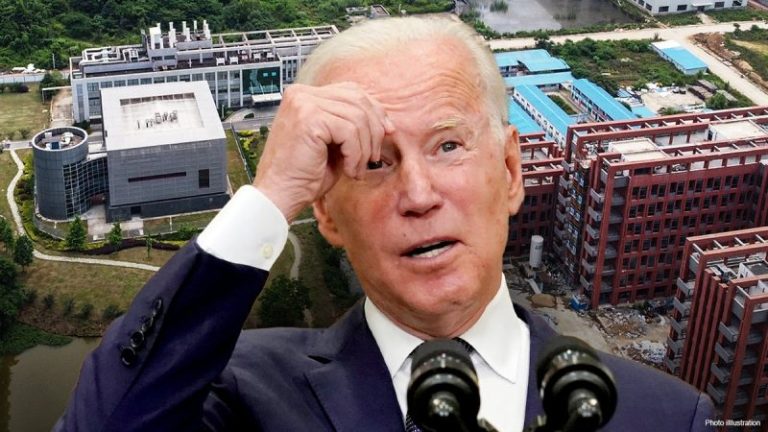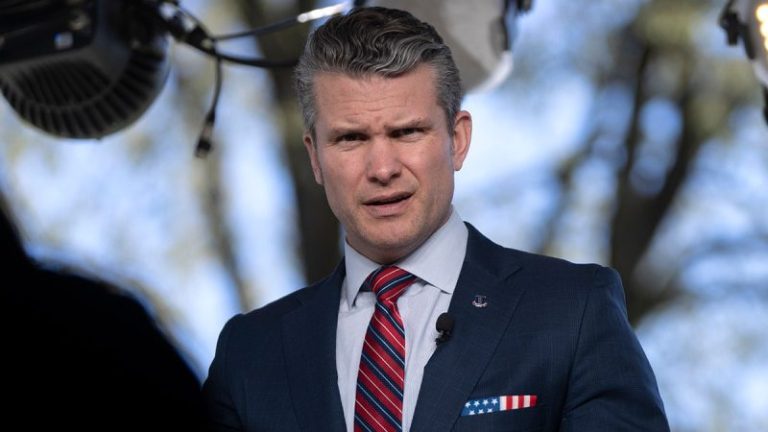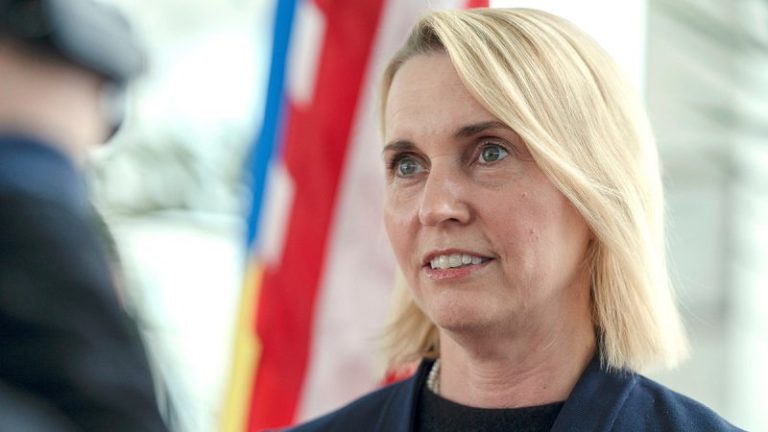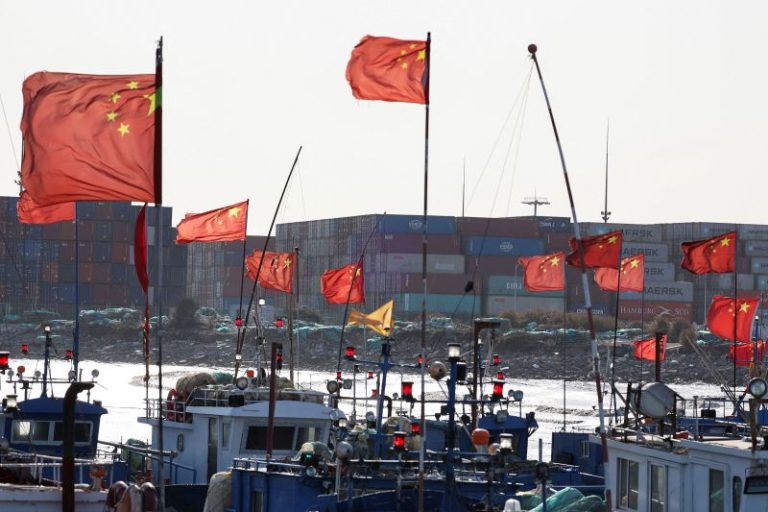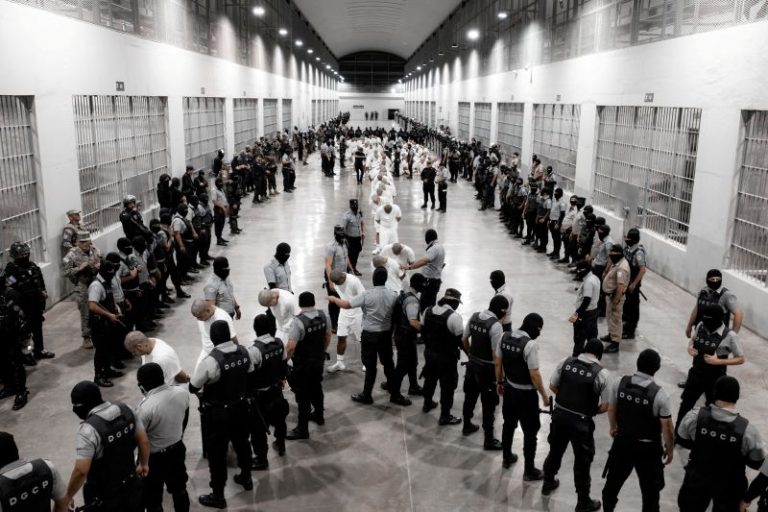What was supposed to be a historic, era-defining trade war launched by US President Donald Trump against a range of countries has, for now, narrowed in on a singular target: China.
On Wednesday, Trump announced a three-month pause on all the “reciprocal” tariffs that had gone into effect hours earlier – with one exception, deepening a confrontation set to dismantle trade between the world’s two largest economies.
The pace of that escalation has been stunning. Over the course of a week, Trump’s tariffs on Chinese imports have jumped from 54% to 104% and now 125% – figures that add to existing levies imposed prior to the president’s second term. And China has retaliated in kind, raising additional, retaliatory duties on all US imports to 84%.
The showdown sets up an historic rupture that will not only cause pain for both of these deeply intertwined economies – but add tremendous friction to their geopolitical rivalry.
“This is probably the strongest indication we’ve seen pushing towards a hard decoupling,” said Nick Marro, principal economist for Asia at the Economist Intelligence Unit, referring to an outcome where the two economies have virtually no trade or mutual investment.
“It’s really hard to overstate the expected shocks this is going to have, not just to the Chinese economy itself, but also to the entire global trading landscape,” as well as on the US, he said.
Trump appeared to link his decision not to grant China the same reprieve as other nations to Beijing’s swift retaliation, telling reporters Wednesday that “China wants to make a deal, they just don’t know how quite to go about it.”
But the view from Beijing looks dramatically different.
Chinese leader Xi Jinping, China’s most powerful leader in decades, sees no option for his country to simply capitulate to what it calls America’s “unilateral bullying.” And he’s playing to his crowd. Publicly, Beijing has drummed up fervent nationalism around its retaliation – part of a strategy it’s been quietly preparing for more than four years since Trump was last in office.
While China has long said it wants to talk, Trump’s rapid escalation instead appears to have confirmed for Beijing that the US doesn’t. And in Xi’s calculation, observers say, China is prepared not just to fight back, but to use Trump’s trade turmoil to strengthen its own position.
“Xi has been very clear for a very long time that he expects China will enter a period of protracted struggle with the United States and its allies, that China needed to prepare for that, and they have quite extensively,” said Jacob Gunter, lead economy analyst at Berlin-based think tank MERICS.
“Xi Jinping has accepted that the gauntlet is thrown down, and they are ready to put up a fight.”
Whether Trump would have suspended his so-called retaliatory tariffs on China alongside other nations had Beijing not moved so swiftly to retaliate remains an open question. Canada had retaliated but was included in the reprieve, which does not remove a 10% universal tariff imposed last week.
Regardless, Trump, who the White House described earlier this week as having a “spine of steel,” and Xi now appear locked in a war of attrition with the potential to upset a lopsided but highly integrated trade relationship worth roughly half a trillion dollars.
For decades, China has been the world’s factory floor, where increasingly automated and high-tech production chains churn out everything from household goods and shoes to electronics, raw materials for construction, appliances and solar panels.
Those factories satisfied the demand of American and global consumers for affordable goods but fueled an enormous trade deficit – and a feeling among some Americans, including Trump, that globalization has stolen US manufacturing and jobs.
Trump’s ratcheting up of tariffs to well over 125% could now cut China’s exports to the US by more than half in the coming years, by some estimates.
Many goods from China won’t be able to be quickly replaced – driving up US consumer prices, potentially for years, before new factories come online. That could ring up a tax hike for Americans of roughly $860 billion before substitutions, JP Morgan analysts said Wednesday.
In China, a wide swath of suppliers are likely to see their already narrow margins completely erased, with a new wave of efforts to establish factories in other countries set to begin.
The scale of the tariffs could lead to “millions of people becoming unemployed” and a “wave of bankruptcy” across China, according to Victor Shih, director of the University of California San Diego’s 21st Century China Center. Meanwhile, US exports to China could “go close to zero,” he added.
“But China can sustain that (situation) much more so than American politicians can,” he said.
That’s, in part, because China’s ruling Communist Party leaders do not face swift feedback from voters and opinions polls.
“During Covid they shut down the economy (causing) untold employment, suffering – no problem.”
Beijing too believes it can weather the storm.
“In response to US tariffs, we are prepared and have strategies. We have engaged in a trade war with the US for eight years, accumulating rich experience in these struggles,” a commentary on the front page of Communist Party mouthpiece People’s Daily said Monday.
It noted Beijing could take “extraordinary efforts” to boost domestic consumption, which has been persistently weak, and introduce other policy measures to support its economy. “The plans to respond are well-prepared and ample,” the commentary said.
And in the face of unknowns about how much further measures could escalate, voices from Beijing appear calm.
“The ultimate outcome hinges on who can withstand a longer ‘economic war of attrition,’” economist Cai Tongjuan of China’s Renmin University wrote in a state media op-ed earlier this week. “And China clearly holds a greater advantage in terms of strategic endurance.”
Beijing in recent weeks has also been talking to countries from Europe to Southeast Asia in a bid to expand trade cooperation – and one up the US by winning over American allies and partners exasperated by the on-again-off-again trade war.
But it’s been bracing for US trade frictions since Trump’s first trade war and his campaign against Chinese tech champion Huawei, which were a wake-up call to Beijing that its economic rise could be derailed if it wasn’t prepared.
“The Chinese government have been preparing for this day for six years – they knew this was a possibility,” said Shih in California, who added that Beijing had supported countries to diversify supply chains and looked to manage some of its domestic economic challenges in preparation, among other efforts.
Today, China is much better placed to weather a broader trade conflict, experts say. Compared with 2018, it’s expanded its trade relations with the rest of the world, reducing the share of US exports from roughly one-fifth of its total to less than 15%.
Its manufacturers have also set up extensive operations in third countries like Vietnam and Cambodia, in part to take advantage of potentially lower US duties.
China has also built out its supply chains for rare earths and other critical minerals, upgraded its manufacturing technology with AI and humanoid robots and ramped up its advanced technology capabilities, including semiconductors. Since last year, the government has also worked, with varying success, to address issues like weak consumption and high local government debt.
“(China’s) weaknesses are significant, but in the context of an all-out brawl, these are manageable. The US is not going to be able to, on its own, bring China’s economy to the edge of destruction,” said Scott Kennedy, a senior adviser at the Center for Strategic and International Studies think tank in the US.
“As much as Washington doesn’t want to admit it, when China says you can’t contain China economically, they have a point.”
This post appeared first on cnn.com



